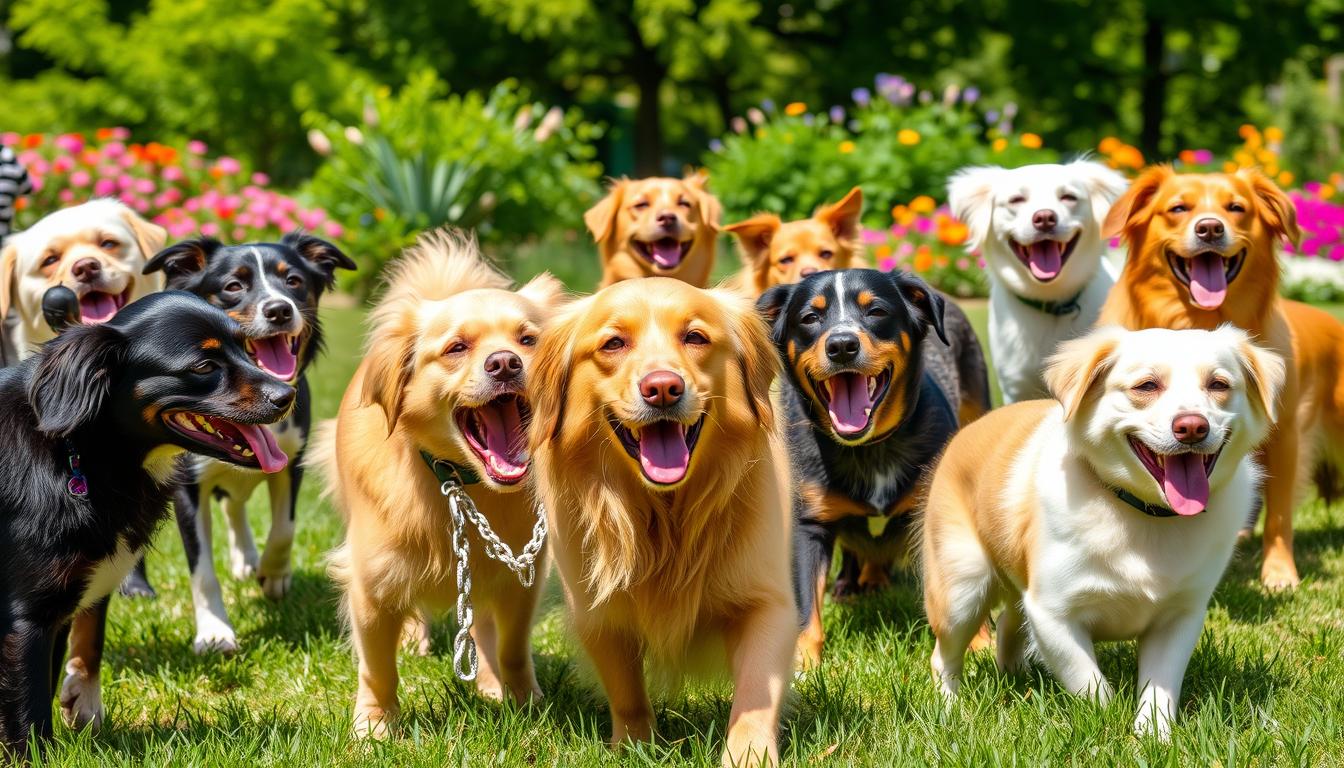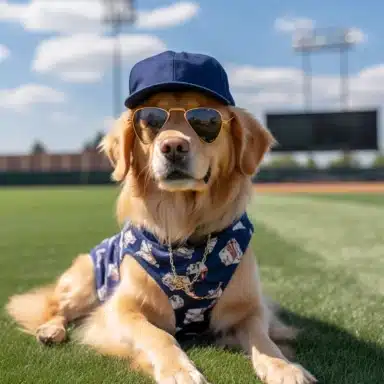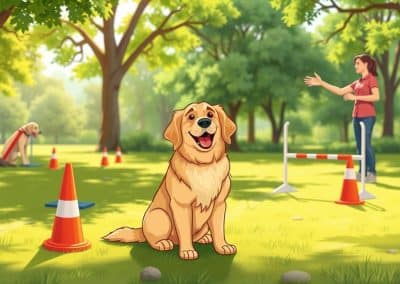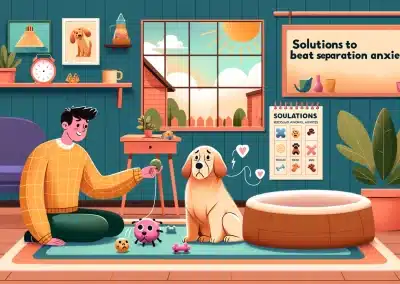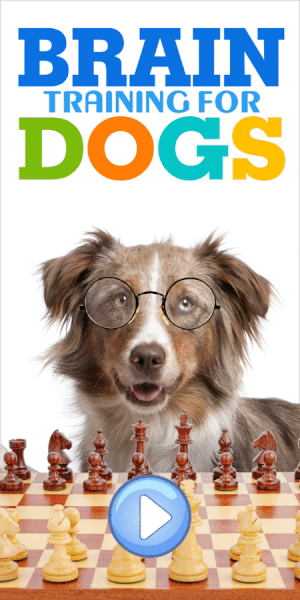Help Your Golden Retriever Make Friends. As a proud Golden Retriever owner, I’ve seen the joy they bring. Wondering how to help your dog make friends? It’s all about understanding their pack behavior and early socialization.
Golden Retrievers love to socialize and bond with other dogs. Their friendly nature makes them want to join new groups. But, it’s important to guide them to ensure these interactions are safe and positive.
Key Takeaways
- Golden Retrievers have a natural inclination for socialization and pack behavior.
- Early socialization, between 3 and 14 weeks of age, is critical for developing positive social skills.
- Proper training and management of first introductions can help Golden Retrievers make new friends safely.
- Choosing compatible playmates and creating positive associations are key to successful dog socialization.
- Regular practice and exposure to new social situations will help your Golden Retriever become a confident, well-adjusted companion.
Understanding Golden Retriever Social Nature
Golden Retrievers are known for being friendly and social. They make great pets for many owners. As puppies, they are full of energy and love to play with people and other dogs.
Natural Pack Behavior
Like many dogs, Golden Retrievers have a strong pack instinct. They love being around people and other dogs. This makes them eager to join in on fun activities and explore new places.
Social Temperament Traits
- Friendly and outgoing personality
- Eagerness to interact with both familiar and unfamiliar individuals
- High tolerance for noise and activity in their environment
- Adaptability to a wide range of social situations
Breed-Specific Social Characteristics
Golden Retrievers are known for their great social skills. Their friendly nature and curiosity make them great friends for many dogs. Getting them used to different dogs early helps them be more open and friendly.
| Characteristic | Description |
|---|---|
| Sociability | Golden Retrievers are highly sociable, thriving in environments with multiple dogs and people. |
| Adaptability | They readily adapt to new situations and different social settings, making them versatile companions. |
| Playfulness | Golden Retrievers possess an abundance of energy and a love for play, fostering positive interactions. |
Knowing about Golden Retrievers’ pack behavior, social traits, and breed characteristics helps owners. It prepares them for socializing their dogs with others. This knowledge is key to creating positive experiences and strong bonds between Golden Retrievers and other dogs.
The Importance of Early Socialization
Socializing your Golden Retriever puppy early is key for their growth into a well-behaved and confident friend. In the first months, socialization shapes their personality and actions. By introducing them to various sights, sounds, people, and animals in a positive way, we prepare them for life.
The first four months are when puppies’ brains grow the most. This makes it a vital time for puppy training and socialization. Experts say to introduce puppies to new things between 3-16 weeks. This helps them get used to different places, textures, and people, always rewarding good behavior with positive reinforcement.
“Improper socialization can lead to behavior problems later in a dog’s life, with behavioral issues being the number one cause of death for dogs under 3 years of age.”
Studies confirm that regular exposure to new things is crucial for a puppy’s growth. Socialization boosts confidence, teaches communication, and prevents fears. Owners should plan at least one outing a week to help their puppy meet the world.
By socializing your Golden Retriever puppy well, you ensure they have a lifetime of good interactions. Remember, puppy training and socialization are closely linked. The effort you put in now will greatly benefit them in the future.
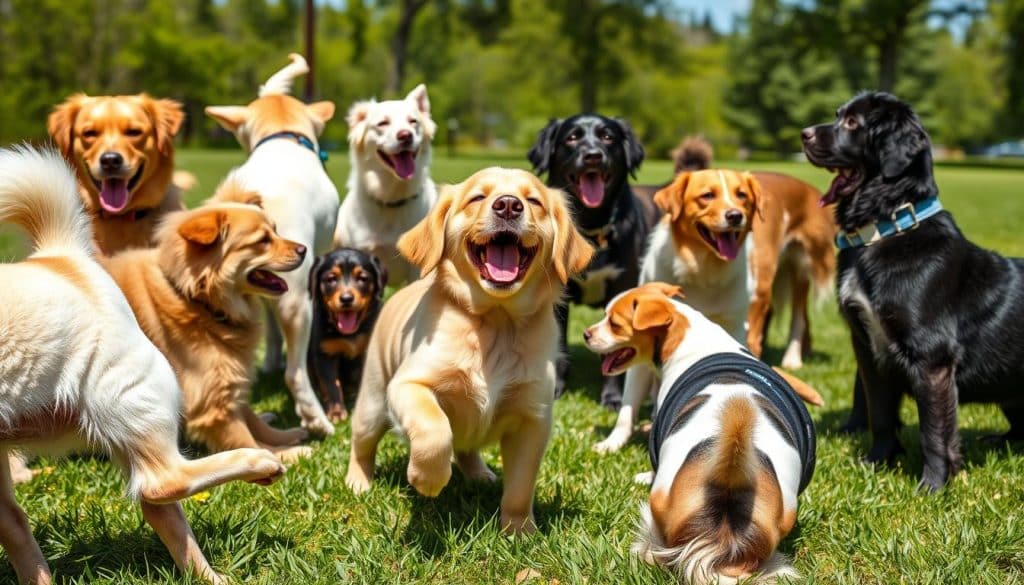
Help Your Golden Retriever Make Friends
As proud owners of a friendly Golden Retriever, we know how important it is for our canine companions to socialize and make new dog friends. Helping your Golden Retriever navigate social situations requires understanding their dog body language, creating positive associations, and carefully managing first interactions.
Reading Dog Body Language
Watch how your Golden Retriever acts when meeting other dogs. Are they excited and eager to play, or do they seem shy and hesitant? Learning to read your dog’s body language is crucial to knowing their comfort level and adjusting the situation.
Creating Positive Associations
- Socialize your Golden Retriever in low-stress environments, such as walks in areas with more dogs or popular trails.
- Use positive reinforcement, like treats and praise, during interactions to help your dog associate other dogs with positive experiences.
Managing First Interactions
Be ready to step in if the interaction becomes too much for your Golden Retriever. Practice eye contact exercises to boost your dog’s confidence in social situations. When introducing your Golden to a new dog, choose a neutral territory to prevent territorial disputes.
Remember, patience and understanding are key when helping your Golden Retriever make new friends. With time and proper socialization, your friendly pup can thrive in canine social settings.
Choosing the Right Environment for Dog Introductions
We know how crucial it is to create a safe space for our Golden Retrievers to socialize. The right location for introducing them to other dogs is key. It can make or break their friendship.
Choosing neutral territory is important. It’s a place where neither dog feels the need to defend their space. This helps avoid fights and lets them meet in a friendly way. Dog parks, quiet public areas, or a friend’s backyard are great spots.
Keeping the introduction safe is also vital. Places like these offer a calm setting for our Golden Retrievers to meet. We can watch over them and step in if needed, making sure it’s a good experience for everyone.
Introducing Golden Retrievers to cats needs special care. Using a carrier or crate helps the cat feel safe and in control. It lets them get used to each other slowly and safely.
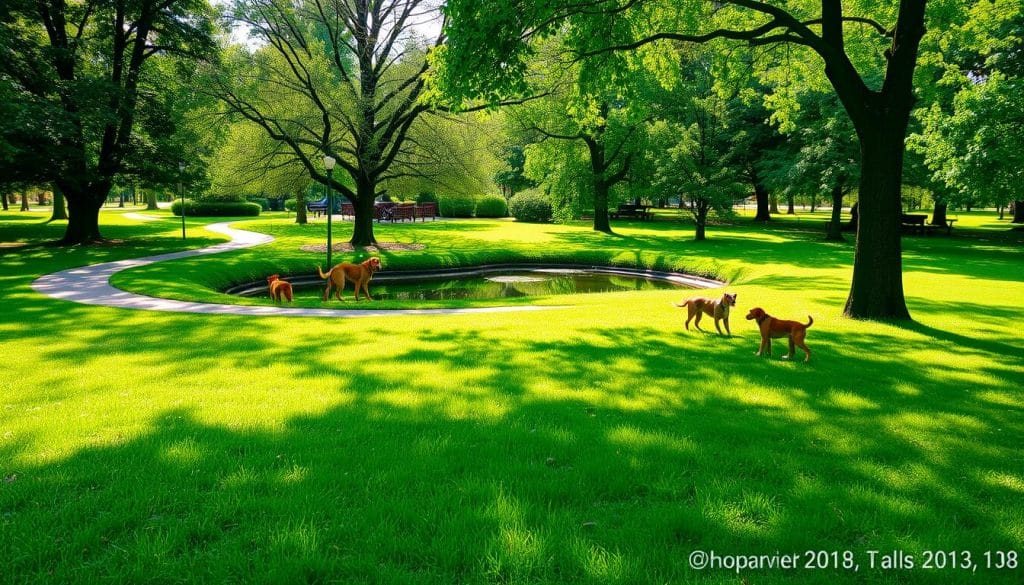
By picking the right spot for introductions, we help our Golden Retrievers have great social experiences. This is good for their happiness and helps them grow into confident, well-adjusted friends.
Safe Introduction Techniques
Introducing your Golden Retriever to new dogs is a big step in their socialization. It’s important to do it safely. We’ll talk about three main ways: meeting in neutral places, using leashes, and controlling distance.
Neutral Territory Meetings
Choose a neutral spot like a park or a friend’s backyard for the first meeting. This avoids territorial issues. Let the dogs sniff and explore each other calmly.
Leash Management Tips
Keep both dogs on leashes at first. But don’t pull too hard, as it can cause stress. Stay calm and confident, as dogs pick up on our feelings.
Distance Control Methods
As they get more comfortable, slowly bring them closer. This lets them bond without feeling too much. Watch their body language and step in if needed. Positive reinforcement for good behavior helps a lot.
Safe introductions and socialization are key for your Golden Retriever’s happiness. By using these methods, you’ll help your dog make friends and have great social experiences.
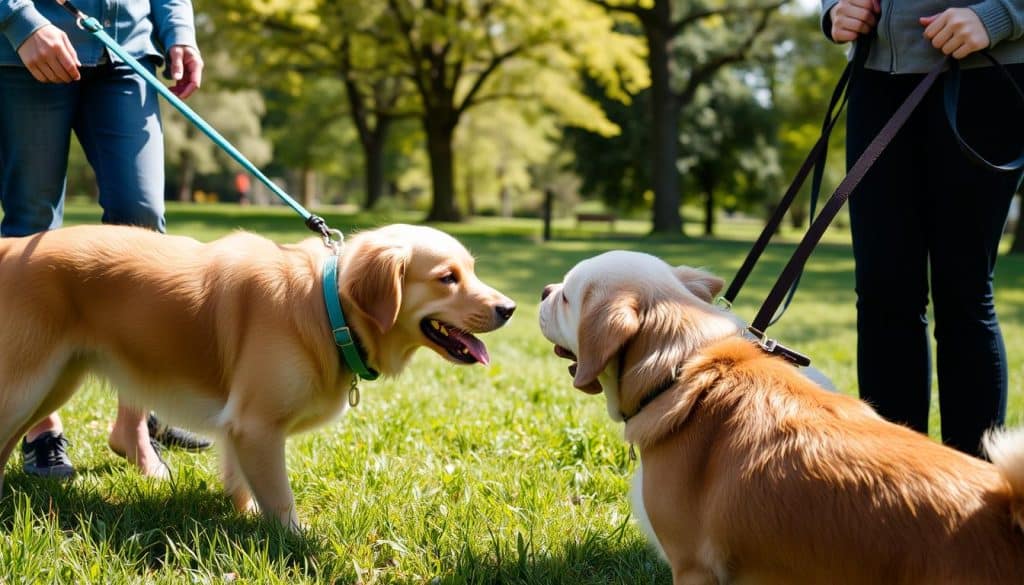
Common Challenges During Dog Socialization
Socializing our dogs can be rewarding but also complex. As Golden Retriever owners, we often face dog behavior problems, socialization challenges, and canine aggression. Understanding these challenges is key to helping our dogs overcome them.
Aggressive behavior is a common issue, showing up in different ways. Some dogs may display dominance or fear in new situations. Others might get too excited, leading to bad behaviors like jumping or nipping.
It’s important to tackle these socialization challenges early and often. For dominance issues, positive training helps dogs learn right social cues. Shy or anxious dogs need slow exposure to new things to build confidence.
Successfully socializing dogs depends on recognizing and managing these dog behavior problems. With the right tools and guidance, our Golden Retrievers can handle social situations well. This leads to positive interactions with other dogs.
| Socialization Challenge | Potential Causes | Recommended Strategies |
|---|---|---|
| Aggressive Behavior |
|
|
| Fear and Anxiety |
|
|
| Overexcitement |
|
|
By tackling these dog behavior problems and socialization challenges, we can make our Golden Retrievers confident and friendly. With patience, persistence, and positive reinforcement, we can help them thrive in social situations.
Managing Multi-Dog Interactions
Managing a household with multiple dogs can be both rewarding and challenging. As Golden Retriever owners, we need to understand how they play together. We must also supervise them closely and be ready to solve any conflicts. By creating a peaceful environment, our dogs can live happily together.
Group Play Dynamics
When we introduce our Golden Retrievers to other dogs, it’s important to watch how they play. We want the play to be fun and fair for everyone. By knowing each dog’s personality and how they communicate, we can make sure they feel safe and enjoy playing together.
Supervision Strategies
Watching our dogs closely is crucial when they’re playing together. We need to notice their body language and step in if things get too rough. Using positive rewards can help them behave well and get along better.
Breaking Up Conflicts
Even with careful planning, conflicts can still happen. It’s important to have a plan to stop fights safely. We might use body blocks, commands, or separate them to keep everyone safe. By quickly solving problems, we can keep our dogs happy and peaceful.
| Behavior | Intervention Strategies |
|---|---|
| Rough play |
|
| Resource guarding |
|
| Aggression |
|
By actively managing how our dogs interact, we can create a happy and enriching home for them. With the right approach and attention, our Golden Retrievers can enjoy a wonderful life together.
Building Positive Experiences at Dog Parks
As golden retriever owners, we know how vital socialization is for our pets. Dog parks are great for our golden retrievers to meet new friends and play. But, we must be careful to ensure they have good experiences.
Start by taking your golden retriever to the dog park for short visits when it’s not too busy. Watch how they feel and slowly make the visits longer. Give them treats and praise when they act calm and friendly. This makes the dog park a happy place for them.
Keep a close eye on your dog when they’re with others. Be ready to leave if it gets too stressful or if your dog seems uncomfortable. Your dog’s happiness is the most important thing.
| Frequency of Visits | Dog’s Behavior | Owner’s Intervention |
|---|---|---|
| 5 days a week | Frequent unfriendly behavior from other dogs, submissive and overwhelmed | Calling the dog to distract her from other dogs |
| 2 days a week (daycare) | Positive interactions, well-managed environment | Providing mental stimulation and bonding activities |
Not all golden retrievers will enjoy dog parks. Look for other fun activities like training, agility, or obedience classes. These can make your dog happy and fulfilled.
By making dog parks positive and trying other fun activities, we can help our golden retrievers feel confident and close to us. The secret to good socialization is finding the right balance and using positive reinforcement.
Training Commands for Social Situations
Teaching our Golden Retrievers important commands is key for socializing. Commands like “sit,” “stay,” and “leave it” help keep them safe and well-behaved. These commands are vital for managing their excitement and ensuring they act right in public.
Essential Commands for Control
Teaching basic obedience commands helps our Golden Retrievers listen to us, even when things get exciting. By practicing these commands, we help our dogs stay focused on us. This makes them better behaved around other dogs and people.
Emergency Recall Training
Teaching the “recall” or “come” command is also very important. It keeps our Golden Retrievers safe. By training them in different places with distractions, they learn to come back to us quickly. This skill is crucial for their safety and well-being.
Distraction Management
Golden Retrievers are social and can get distracted easily. It’s important to teach them to stay focused on us, even in busy places. With positive training and practice, they learn to listen and behave well. This makes socializing safer and more enjoyable for everyone.

